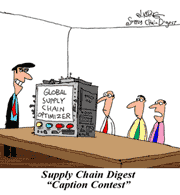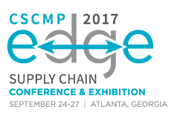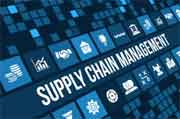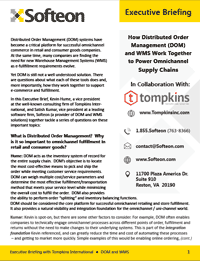Trip Report - CSCMP 2017 in Atlanta
I am fresh back from Atlanta and CSCMP's 2017 annual conference. It was a good week, and I spoke with more SCDigest readers than at any conference ever.
All told I give the event good marks, with better content than the past two years, a perspective I heard others endorse.
Thousands of you have watched my daily video recaps of the conference. You will find them here: CSCMP Day 1 Video Review, Day 2, and Day 3.
| SHERMAN SAYS: |
Cummings believes in 10-20 years or so there will be no fighter pilots needed - it will all be drones. "Top Gun" just gone.
WHAT DO YOU SAY?
Send us your
Feedback here
|
As you may or may not have seen, the event is now called CSCMP Edge, after basically forever being just referred to as the CSCMP/CLM annual conference.
This is certainly an effort to better brand the event, in the way most software companies have a name for their user conferences (Sapphire, Focus, etc.), and I suspect the move is in part to broaden the perception a bit away from a "member conference" to a more general supply chain event. (Though it will be interesting to see how long if ever it will take for people to say "Are you going to Edge?" instead of "CSCMP").
Once again, there were around 3000 attendees. I heard from someone in the know that there were about 2700 pre-registrants, and they hoped for about 300 walk-ins.
The history of this interesting: attendance peaked in the late 1990s, I believe surpassing 6000 at some point. But then the 9-11 attacks happened, taking the crowd sharply back down, as it did to many other events.
Attendance has been stuck somewhere in that just under 3000 range for some time. Can it ever be taken back to higher levels again? That is a key organizational question for CSCMP. I believe so, but it will take hard and smart work. As comparisons, the upcoming APICS conference has been drawing about 1800 attendees recently, the Gartner Supply Chain Executive Conference has been getting about 1900 of late, and the Institute for Supply Management conference gets a perhaps surprising 2500 or so.
From a big picture perspective, there were 18 breakout session tracks this year, ranging from supply chain leadership to warehousing, up from 16 the past two years, but down from 20 in 2014, and 26 in 2013.
All told the winnowing of tracks in my opinion is a good move.
Still, there were just over 100 total educational sessions over the first two days by my count, a substantial number for sure.
There were again just three 75 minutes breakout session slots (usually 18 presentations in each slot) in each of the first two days, as has been the case for the past four years. That's down from four shorter daily breakouts in 2013. As I have said for the past few years, I think 75 minute sessions are too long, and I would like to see four session slots per day. One way this could be accomplished without adding bloat is to not have every session slot include every track.
On the final day, Wednesday, the crowd pulls back to maybe one-third of the first two days. In Atlanta, there once again were three 90-minute "mega-sessions" to choose from to start the morning, followed by 90 minutes or so of closing festivities, including as always a motivational-type speaker.
Once again this year, on Sunday before my arriving there was a group exercise of some 200 attendees packing meals for the poor across the globe. Again some 45,000 meals were produced, an operation funded for the third year by Monsanto and CH Robinson.
I also missed a new "supply chain unchained" feature at the Sunday evening welcome reception, in which a wide number of supply chain professionals sang or played instruments of all types in sort of karaoke fashion. The video of it looked fun, and CSCMP says the feature will move to Monday night next year so more people can participate and see it. Fortunately, I neither sing nor play an instrument, ut will enjoy watching.
In his opening comments Monday, CSCMP CEO Rick Blasgen as he often does touted the importance of the supply chain profession, and noted what a great time it was to be a supply chain pro right now. He made the smart observation that increasingly supply chain is not being viewed as just an internal function, but rather as a customer facing one. He also noted the growing number of supply chain executives moving into more general management roles and even CEO positions.
Outgoing board chain Mary Long, who after a long career in industry recently moved to head a supply chain program at the University of San Diego, told the audience there were three key new required skills in supply chain: collaboration cubed - the ability to build trust and alignment; true network thinking - traditional linear supply chains are almost archaic; and the ability to be very comfortable with data and driving a data-driven decision-making culture. That was good.
The opening day keynoter was an interesting guy named Mathew Luhn, who has worked as an animator and now "story teller" for Pixar studios. His message was all about story telling, and he believes the well-known principles for telling stories in the entertainment industry can be applied to business presentations as well.
|



![]()
![]()

![]()







 To what degree that is really true I am still pondering, but it was interesting stuff. Certainly, we can all agree, stories will be remembered more than the data. He ended with three keys to story telling, which were: be authentic - it must come from the heart; beware of having mixed messages that obscure the main one; and remember the three phases that every good story should follow - the set-up, the build, and the the payoff. I think there is indeed something there for thinking how to structure presentations.
To what degree that is really true I am still pondering, but it was interesting stuff. Certainly, we can all agree, stories will be remembered more than the data. He ended with three keys to story telling, which were: be authentic - it must come from the heart; beware of having mixed messages that obscure the main one; and remember the three phases that every good story should follow - the set-up, the build, and the the payoff. I think there is indeed something there for thinking how to structure presentations.

